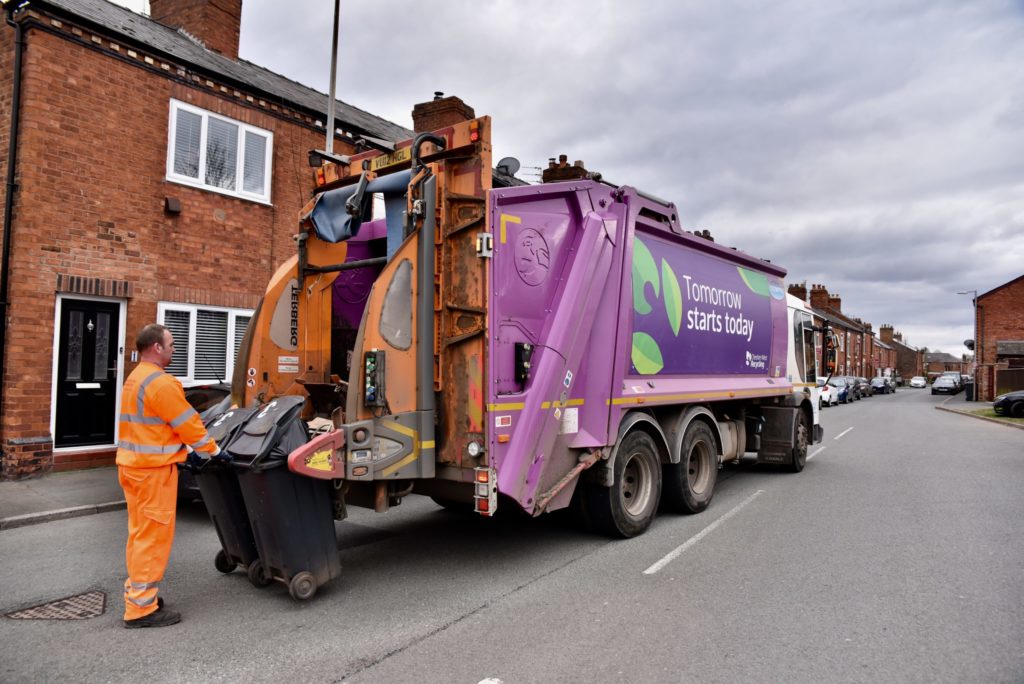In an exclusive interview with Steve Eminton, Environment Secretary Hilary Benn explains the thinking behind landfill bans and reassures councils that they will not suffer if the definition of municipal waste changes.
Local authorities and waste management companies look set to have to grapple with landfill bans being imposed for different waste streams on different dates over the years to 2020.
This was the indication given to letsrecycle.com by environment secretary Hilary Benn who confirmed that the bans were very much on his agenda in a bid to further discourage waste materials from being sent to landfill.
Ahead of a consultation on the bans – which could be issued in February 2010 – Mr Benn described them as an “encouragement” and as a form of “mutual support” for the landfill tax.
Asked whether landfill bans were Defra’s cause clbre for waste at present and whether they were really necessary in light of the rising landfill tax, the Secretary of State said: “We are trying to make progress on a number of fronts. As I said at my World Without Waste speech in October, why do we put all these valuable products in landfill?
“For me it is about the two things supporting each other which is why we have got to the point of landfill bans, they will mutually support each other so we can get to where we want to be. Landfill tax has had an impact, but it is about thinking ahead, being ambitious. It does not make sense to put food waste or wood or plastic or glass or aluminium cans or tin cans into landfill.”

With AD, the landfill levy is avoided and we have created a whole incentive framework to turn it into renewable energy
Hilary Benn, Secretary of State for Environment, Food and Rural Affairs
Part of the reason behind Mr Benn’s thinking is thought to be the fact that the UK still sends 50% of household waste to landfill as well as a large percentage of commercial and industrial (C&I) waste.
By banning materials from landfill, this will encourage further recycling, said Mr Benn. “By saying you are not going to stick this into landfill any more, then we need to find another way of dealing with it which will further support the way this material is recycled and build on what we have achieved already through the efforts of local authorities, and I pay tribute to them in responding to the landfill levy.”
The Secretary of State singled out food waste as one of the key target areas for future landfill bans arguing that it makes no sense to landfill this “for obvious reasons, both because of the methane and the fact that you have a fantastic alternative which is either composting or producing renewable energy.”
And, he suggested that all local authorities ought to be collecting food waste at least by 2020 although a precise date will be consulted on. Mr Benn remarked: “If some local authorities can collect food waste, why can’t all local authorities collect food waste?”
Anaerobic digestion
And, he emphasised the logic of a landfill ban in the case of food waste which will help encourage new infrastructure such as anaerobic digestion (AD). “By definition, I take you back to landfill bans; this is a policy that has a number of benefits for clearly when we get to the point that food no longer goes into landfill clearly every local authority is going to have to find another way of dealing with it.”
Mr Benn dismissed industry claims that AD developers are finding it hard to get funding for projects and said: “We have done a huge amount on AD as this is an emerging technology with enormous potential. We have doubled the incentives under ROCs from the first of April last year, Feed-in-Tariffs will come in, there is 10m for the demonstrator projects, and the EA has said digestate will not be classified as a waste and the AD task force is working with the industry. Frankly it is a technology which is waiting to take off because all the building blocks are in place.
“With AD, the landfill levy is avoided and we have created a whole incentive framework to turn it into renewable energy.”
Mr Benn also highlighted the fact that farmers could use AD to process slurry which would help them meet requirements for nitrate vulnerable zones under the Nitrates Directive. He explained: “An alternative to storage is for farmers to stick slurry into AD so there are two issues to deal with: food waste emissions from landfill and slurry that can’t go on land and AD is the answer to both of them. I think the only remaining obstacle is a lack of familiarity with the technology in the UK which I think over time will change when people see it working.”
Household progress
In terms of progress in the UK, Mr Benn highlighted the success in driving the household recycling rate up to 37%. “We have made considerable progress on the household side, rising from 8% to 37% recycling in the space of 12 years which is good but we do need to go further and the landfill levy has been a very successful policy for promoting recycling.
“One of the problems we have had with C&I waste is not knowing the current figure, which is why one of the things we are going to do is do a new survey. We know it was already ahead of households at 40% in 2002/03. When the survey is done we will have a much more up to date picture.”
The Secretary of State denied that C&I waste had been ignored by his department. He said: “On the back burner, no, because the landfill levy applies to it as much as other waste. It will be really interesting to see the figures and we have recognised we needed to have a better understanding and recognise what else we will need to do.
He would not say whether there will be targets set for C&I waste although he did point out that some had been set for the construction sector. And, while no data has been generated yet, Defra considered that the landfill levy might produce a further 20% reduction in C&I waste from 2004 to 2010 although the survey will confirm what has happened.
With only three years to go to meet targets for the diversion of biodegradable waste from landfill, Mr Benn chose not to say whether the UK might face fines from the European Union for failing to meet targets. Instead, he said that he was “a great believer in these circumstances on focusing on concentrating on meeting the targets and meeting the challenges in hand.”
And, he noted how Defra has tried to boost the level of infrastructure that will be available in 2013. “For municipal waste, we have a big PFI credit programme and local authorities are hard at work. The argument about landfill bans throws into sharp focus what we are going to do. We need to follow the waste hierarchy down to energy from waste and I think views on this are starting to change.”
Europe
Referring to European countries with low landfill rates, he said: “You look at countries with high recycling rates and it is energy from waste that makes the difference, we are not at the bottom of the league table for recycling, we are heading towards the middle and it is the energy from waste that also makes the difference.”
Planning permission, conceded Mr Benn, is not easy to get for plants, but the issue of energy needed to be addressed.
“The fundamental question about energy is how are we going to get it? It is either going to come from coal with carbon capture and storage, or it is going to come from gas, or nuclear or from wind, or it is going to come from anaerobic digestion or from waste. You can always find an argument, or some people can find an argument to object to all those forms of energy generation but the question then is where do you think your electricity is going to come from? Part of the problem in our society is that we have become divorced from the way energy is generated.
“There is a no, no, no, no but you will keep the lights on won’t you and we’re not being straight with each other if that is what happens. That is for example why feed in tariffs are not only a good policy for small scale generation but the other good thing is that they reconnect us with the way in which energy is generated. People see it as a benefit for them as a turbine which is supported by a feed in tariff is providing the energy for that community and they see a financial benefit and suddenly their whole relationship to the generation of energy had changed.”
However, the Secretary of State offered no concessions to traditional energy from waste plants under the renewables obligation where they receive no benefit. He remarked that the alternative is landfill and so with the levy in place there is an advantage for the plants. And, he referred to the importance of capturing heat from incinerators. “There is the renewable heat incentive which DECC is working on because clearly if you can find a way of taking the heat as well as the energy that is generated then you have got a double benefit for society. That is something we are keen to try and progress by getting that renewable incentive right.”
Municipal waste definition
With Defra getting to grips with the definition of municipal waste which had been discussed many times by Mr Benn’s predecessors, the current Secretary of State commented: “We are in the process of sorting it out.”
The Department’s view, reflected by Mr Benn, was that it is only relatively recently that the Commission has made it absolutely clear what the preferred definition is based on chapters 20 and 21 of the European Waste Catalogue. This does include commercial waste “similar in catchment to household waste.”
There has been speculation about the impact of the changes of definition, especially if it increases the baseline figures on which diversion targets are set. But, the Secretary of State said that the obligations on councils will not change and that they should not worry. A Defra view is that over time the “collection arrangements will evolve in collection areas”.
The future
In the wake of the EFRA Committee report, which levelled some criticisms at Defra, Mr Benn remains positive. He said: “I think overall – there are two things, we have made a lot of progress – and it is really important to acknowledge the progress we have made – and secondly we do need to do more. We have lived through a period of time as human beings when we thought we could take, use and chuck away with no thoughts to the consequence, a 50-year bubble which we have lived in, and now the bubble has burst.”
Reflecting on almost a new approach across the commercial and municipal sector, he said: “You go back in the story of human history, people recycled, made do, re-mended, people now realise that you need to do this. I am absolutely convinced we can do more and my job is to put the right regulatory regime and incentives into place. But, it is also about an attitude of mind. If one shopping centre can be collecting stuff of its own back and separating it out well then every shopping centre can do it. If one local authority can collect food waste then all local authorities can collect food waste – the fact is that everywhere you look you can find the future happening now in some places, we need to get on with making the future happen in all places.”











Subscribe for free